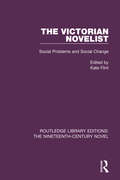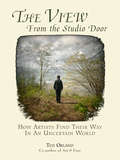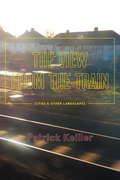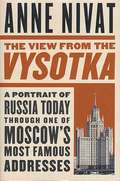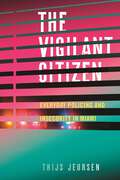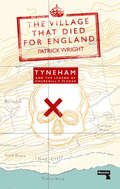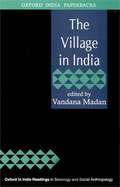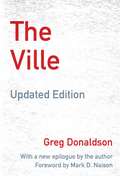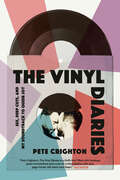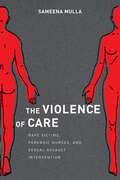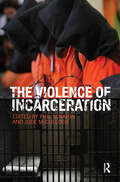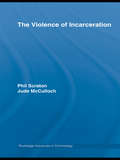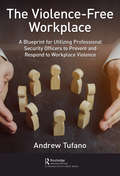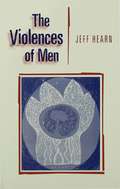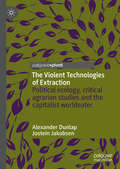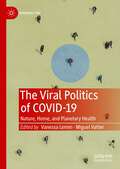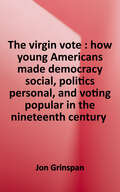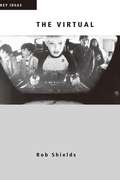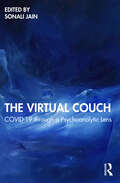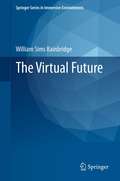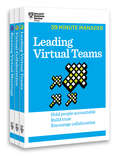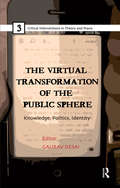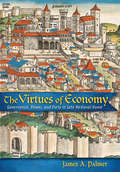- Table View
- List View
The Victorian Novel, Service Work, and the Nineteenth-Century Economy (Palgrave Studies in Nineteenth-Century Writing and Culture)
by Joshua GoochThis book offers a much-needed study of the Victorian novel's role in representing and shaping the service sector's emergence. Arguing that prior accounts of the novel's relation to the rise of finance have missed the emergence of a wider service sector, it traces the effects of service work's many forms and class positions in the Victorian novel.
The Victorian Novelist: Social Problems and Change (Routledge Library Editions: The Nineteenth-Century Novel #14)
by Kate FlintFirst published in 1987. Many Victorian novels that considered social problems made extensive use of contemporary source material for their descriptions. This book aims to provide a greater acquaintance with this non-literary material — illustrating and exemplifying issues that the authors treated imaginatively. The material is divided into parts dealing with: the industrial north of England, London and the agricultural poor. Extracts from writings that bear directly on the fiction of writers like Dickens and Gaskell are featured, as are Government Blue Books and newspaper reports and articles. This volume also contains articles by Dickens and others, from his magazine, Household Words.
The View From The Studio Door
by Ted OrlandIn the perennial best-seller Art & Fear, Ted Orland (with David Bayles) examined the obstacles that artists encounter each time they enter their studio and stand before a new blank canvas. Now, in The View From The Studio Door, Orland turns his attention to broader issues that stand to either side of that artistic moment of truth.In a text marked by grace, brevity and humor, Orland argues that when it comes to art making, theory and practice are always intertwined. There are timeless philosophical questions (How do we make sense of the world?) that address the very nature of art making, as well as gritty real-world questions (Is there art after graduation?) that artists encounter the moment they're off the starting blocks and producing work on a regular basis.Simply put, this is a book of practical philosophy. As a teacher and working artist himself, Orland brings authentic insight and encouragement to all those who face the challenge of making art in an uncertain world. The breadth of material covered is reflected in chapters that include Making Sense of the World, Art & Society, The Education of the Artist, Surviving Graduation, Making Art That Matters, The Artistic Community, and more.The View From The Studio Door is the perfect companion piece to Art & Fear, and will appeal to a similar (and already-established) audience of students, working artists, teachers and professionals. For students' benefit, The View is also modestly priced, with wide page margins for easy note-taking and annotation.
The View From The Train
by Patrick Keiller"Robinson believed that, if he looked at it hard enough, he could cause the surface of the city to reveal to him the molecular basis of historical events, and in this way he hoped to see into the future." In his sequence of films, Patrick Keiller retraces the hidden story of the places where we live, the cities and landscapes of our everyday lives. Now, in this brilliant collection of essays, he offers a new perspective on how Britain works and sees itself. He discusses the background to his work and its development - from surrealism to post-2008 economic catastrophe - and expands on what the films reveal. Referencing writers including Benjamin and Lefebvre, the essays follow his career since the late 1970s, exploring themes including the surrealist perception of the city; the relationship of architecture and film; how cities change over time, and how films represent this; as well as accounts of cross-country journeys involving historical figures, unexpected ideas and an urgent portrait of post-crash Britain.From the Hardcover edition.
The View From the Corner Shop: The Diary of a Yorkshire Shop Assistant in Wartime
by Kathleen HeyKathleen Hey spent the war years helping her sister and brother-in-law run a grocery shop in the Yorkshire town of Dewsbury. From July 1941 to July 1946 she kept a diary for the Mass-Observation project, recording the thoughts and concerns of the people who used the shop. What makes Kathleen's account such a vivid and compelling read is the immediacy of her writing. People were pulling together on the surface ('Bert has painted the V-sign on the shop door…', she writes) but there are plenty of tensions underneath. The shortage of food and the extreme difficulty of obtaining it is a constant thread, which dominates conversation in the town, more so even than the danger of bombardment and the war itself. Sometimes events take a comic turn. A lack of onions provokes outrage among her customers, and Kathleen writes, 'I believe they think we have secret onion orgies at night and use them all up. ' The Brooke Bond tea rep complains that tea need not be rationed at all if supply ships were not filled with 'useless goods' such as Corn Flakes, and there is a long-running saga about the non-arrival of Smedley's peas. Among the chorus of voices she brings us, Kathleen herself shines through as a strong and engaging woman who refuses to give in to doubts or misery and who maintains her keen sense of humour even under the most trying conditions. A vibrant addition to our records of the Second World War, the power of her diary lies in its juxtaposition of the everyday and the extraordinary, the homely and the universal, small town life and the wartime upheavals of a nation.
The View from the Vysotka
by Anne Nivat Frances E. ForteCompleted shortly before Joseph Stalin's death in 1953, the vysotkii, or "sky houses," still dominate the Moscow skyline today. Seven in all, they were the Soviet answer to the American skyscraper, transforming the Soviet capital from a feudal backwater into the city of the future. With their soaring towers and gothic architectural details, the vysotkas were intended to be enduring monuments to the workers state and to the glories of Communism--though they were built on the backs of slave laborers and, initially, the prerogative only of the Soviet elite. Now these imposing giants lie on the fault line between a world that has vanished and one still emerging from its ruins.When she moved to Moscow several years ago, journalist and Russia expert Anne Nivat settled into one of the vysotkas, the one that happens to overlook the Kremlin. She became fascinated by the building and learned everything she could about its history. As she got to know her neighbors and fellow tenants, Nivat discovered that they included some of the building's original inhabitants or their descendants, hand-chosen by Stalin and his henchman Lavrenti Beria (arrested and executed for high treason shortly after Stalin's death)--KGB operatives, Bolshoi ballerinas, and artists of Soviet agitprop. Living side by side with them were representatives of the "new Russia"--entrepreneurs, foreign investors, and oligarchs; as any Moscow real estate agent will tell you, Stalin-era buildings in today's market are some of the most coveted addresses in the city.By means of this decaying but still elegant Soviet icon, Nivat gives us a way of grasping the complexities of a country struggling to come to terms with its past and define its future. She allows the tenants of her vysotka to speak for themselves, to offer their perspectives on where Russia has been and where it is going. Some are keenly nostalgic for the days when the State dictated life. Others have prospered in the confusion that has reigned since the Evil Empire's fall and look to a market-driven economy to guide Russia to the Promised Land. Still others fall some place between the two, anxious but hopeful, longing for yet also fearful of change. Taken together, the portraits of the vysotka's inhabitants provide a panorama of Russia today. The View from the Vysotka shows us life from the inside, evoking both the forces that have swept through this vast and fascinating nation over the course of the last half-century, as well as a building that has managed to endure them.
The Vigilant Citizen: Everyday Policing and Insecurity in Miami
by Thijs JeursenHow the problematic behavior of private citizens—and not just the police force itself—contributes to the perpetuation of police brutality and institutional racism“Warning: Neighborhood Watch Program in Force. If I don’t call the police, my neighbor will!”Signs like this can be found affixed to telephone poles on streets throughout the US, warning trespassers that the community is an active participant in its own policing efforts. Thijs Jeursen calls this phenomenon, in which individuals take on the responsibility of defending themselves and share with the police the duty to mitigate everyday insecurity, “vigilant citizenship.”Drawing on eleven months of fieldwork in Miami and sharing the stories and experiences of police officers, private security guards, neighborhood watch groups, civil society organizations, and a broad range of residents and activists, Jeursen uses the lens of vigilant citizenship to extend the analysis of police brutality beyond police encounters, focusing on the often blurred boundaries between policing actors and policed citizens and highlighting the many ways in which policing produces and perpetuates inequality and injustice. As a central premise in everyday policing, vigilant citizenship frames racist and violent policing as matters of personal blame and individual guilt, ultimately downplaying the realities of how systemically race operates in policing and US society more broadly. The Vigilant Citizen illustrates how a focus on individualized responsibility for security exacerbates and legitimizes existing inequalities, a situation that must be addressed to end institutionalized racism in politics and the justice system.
The Village That Died for England: Tyneham and the Legend of Churchill's Pledge
by Patrick WrightA reissue of Patrick Wright's 1995 classic about the military takeover of the village of Tyneham, with a new introduction taking in Brexit and a new wave of British nationalism.Shortly before Christmas in 1943, the British military announced they were taking over a remote valley on the Dorset coast and turning it into a firing range for tanks in preparation for D-Day. The residents of the village of Tyneham loyally packed up their things and filed out of their homes into temporary accommodation, yet Tyneham refused to die. Although it was never returned to its pre-war occupants and owners, Tyneham would persist through a long and extraordinary afterlife in the English imagination. It was said that Churchill himself had promised that the villagers would be able to return once the war was over, and that the post-war Labour government was responsible for the betrayal of that pledge. Both the accusation and the sense of grievance would reverberate through many decades after that.Back in print and with a brand new introduction, this book explores how Tyneham came to be converted into a symbol of posthumous England, a patriotic community betrayed by the alleged humiliations of post-war national history. Both celebrated and reviled at the time of its first publication in 1995, The Village that Died for England is indispensable reading for anyone trying to understand where Brexit came from — and where it might be leading us.
The Village in India
by Vandana MadanThe village has epitomized Indian civilization and been the subject of much study and contemplation. The essays clearly demonstrate that every Indian village, although similar in many ways, is also characterized by regional variations.
The Ville: Cops and Kids in Urban America, Updated Edition
by Greg DonaldsonIn Brownsville’s twenty-one housing projects, the young cops and the teenagers who stand solemnly on the street corners are bitter and familiar enemies. The Ville, as the Brownsville–East New York section of Brooklyn is called by the locals, is one of the most dangerous places on earth—a place where homicide is a daily occurrence. Now, Greg Donaldson, a veteran urban reporter and a longtime teacher in Brooklyn’s toughest schools, evokes this landscape with stunning and frightening accuracy.The Ville follows a year in the life of two urban black males from opposite sides of the street. Gary Lemite, an enthusiastic young Housing police officer, charges recklessly into gunfire in pursuit of respect and promotion. Sharron Corley, a member of a gang called the LoLifes and the star of the Thomas Jefferson High School play, is also looking for respect as he tries to survive these streets.Brilliantly capturing the firestorm of violence that is destroying a generation, waged by teenagers who know at thirty yards the difference between a MAC-10 machine pistol and a .357 Magnum, The Ville is the story of our inner cities and the lives of the young men who remain trapped there. In the tradition of There Are No Children Here, Clockers, and Random Family, The Ville is a vivid and unforgettable contribution to our understanding of race and violence in America today.
The Vinyl Diaries: Sex, Deep Cuts, and My Soundtrack to Queer Joy
by Pete CrightonA poignant, funny, and lively memoir of sexual awakening, music, and discovering one's true self. Pete Crighton came of age in the early/mid 1980s in the shadow of HIV/AIDS. Growing up in Toronto, he was terrified that his friends and schoolmates would find out that he was &“different&” at a time when being gay felt like a death sentence. His only comfort was music, the songs a balm to his painful adolescence. Struggling to make sense of his sexuality and fear of the disease stifled Crighton as a sexual being. Instead of exploring sex, he began curating a massive music library. He then took what he thought was a safe path and entered into two long-term monogamous relationships, both doomed to fail. Finally, in his 40s, Crighton decided to ignore his fear and live his queer life to the fullest.The Vinyl Diaries is the story of Crighton&’s mid-life sexual awakening. From one-night trysts to friendships resulting from app-based hookups, Crighton is honest and unapologetic as he chronicles the pursuit of his erotic desires. Each new connection and lover is linked to an artist, song, or album from his vast collection and backdrops the stories Crighton tells about his life, interconnected with the artists' work and histories. Kate Bush, the B-52s, Prince, The Smiths, Yoko Ono, and Stevie Nicks are just a few of the artists who provide an extraordinary soundtrack to Crighton&’s adventures.Big-hearted, funny, thoughtful, and wildly entertaining, The Vinyl Diaries is a celebration of sex, music and the discovery of our true selves.
The Violence of Care: Rape Victims, Forensic Nurses, and Sexual Assault Intervention
by Sameena MullaWinner, 2017 Margaret Mead Award presented by the American Anthropological Association and the Society for Applied AnthropologyHonorable Mention, 2015 Eileen Basker Memorial Prize presented by the Society for Medical Anthropology Analyzes the ways in which nurses work to collect and preserve evidence while addressing the needs of sexual assault victims as patientsEvery year in the US, thousands of women and hundreds of men participate in sexual assault forensic examinations. Drawing on four years of participatory research in a Baltimore emergency room, Sameena Mulla reveals the realities of sexual assault response in the forensic age. Taking an approach developed at the intersection of medical and legal anthropology, she analyzes the ways in which nurses work to collect and preserve evidence while addressing the needs of sexual assault victims as patients.Mulla argues that blending the work of care and forensic investigation into a single intervention shapes how victims of violence understand their own suffering, recovery, and access to justice—in short, what it means to be a “victim”. As nurses race the clock to preserve biological evidence, institutional practices, technologies, and even state requirements for documentation undermine the way in which they are able to offer psychological and physical care. Yet most of the evidence they collect never reaches the courtroom and does little to increase the number of guilty verdicts. Mulla illustrates the violence of care with painstaking detail, illuminating why victims continue to experience what many call “secondary rape” during forensic intervention, even as forensic nursing is increasingly professionalized. Revictimization can occur even at the hands of conscientious nurses, simply because they are governed by institutional requirements that shape their practices.The Violence of Care challenges the uncritical adoption of forensic practice in sexual assault intervention and post-rape care, showing how forensic intervention profoundly impacts the experiences of violence, justice, healing and recovery for victims of rape and sexual assault.
The Violence of Incarceration (Routledge Advances In Criminology Ser. #Vol. 5)
by Phil Scraton Jude McCullochConceived in the immediate aftermath of the humiliations and killings of prisoners in Afghanistan and Iraq, of the suicides and hunger strikes at Guantanamo Bay and of the disappearances of detainees through extraordinary rendition, this book explores the connections between these shameful events and the inhumanity and degradation of domestic prisons within the 'allied' states, including the USA, Canada, Australia, the UK and Ireland.The central theme is that the revelations of extreme brutality perpetrated by allied soldiers represent the inevitable end-product of domestic incarceration predicated on the use of extreme violence including lethal force. Exposing as fiction the claim to the political moral high ground made by western liberal democracies is critical because such claims animate and legitimate global actions such as the 'war on terror' and the indefinite detention of tens of thousands of people by the United States which accompanies it. The myth of moral virtue works to hide, silence, minimize and deny the brutal continuing history of violence and incarceration both within western countries and undertaken on behalf of western states beyond their national borders.
The Violence of Incarceration (Routledge Advances in Criminology #Vol. 5)
by Phil Scraton Jude McCullochConceived in the immediate aftermath of the humiliations and killings of prisoners in Afghanistan and Iraq, of the suicides and hunger strikes at Guantanamo Bay and of the disappearances of detainees through extraordinary rendition, this book explores the connections between these shameful events and the inhumanity and degradation of domestic prisons within the 'allied' states, including the USA, Canada, Australia, the UK and Ireland. The central theme is that the revelations of extreme brutality perpetrated by allied soldiers represent the inevitable end-product of domestic incarceration predicated on the use of extreme violence including lethal force. Exposing as fiction the claim to the political moral high ground made by western liberal democracies is critical because such claims animate and legitimate global actions such as the 'war on terror' and the indefinite detention of tens of thousands of people by the United States which accompanies it. The myth of moral virtue works to hide, silence, minimize and deny the brutal continuing history of violence and incarceration both within western countries and undertaken on behalf of western states beyond their national borders.
The Violence-Free Workplace: A Blueprint for Utilizing Professional Security Officers to Prevent and Respond to Workplace Violence
by Andrew TufanoOrganizations are ethically, morally, and legally required to maintain safe workplaces that protects employees, visitors and anyone who frequents their establishments. But why do organizations that employee uniformed security personnel as part of their overall workplace violence prevention program still struggle to create and maintain the safest possible workplaces? To meet these obligations organizations often employ uniformed security officers to deter, observe, and report criminal behavior, and in some contexts, they physically interact with dangerous individuals to protect employees, consumers and visitors from violent behaviors. Unfortunately, many organizations don’t utilize their security personnel to their fullest potential and organizational and community members continue to be victims of workplace violence. This book identifies the flawed principles, policies and personnel decisions that organizations use, and it provides practical solutions to address them. The book covers two major themes: the misapplication of law enforcement community safety principles to private, free-market businesses and the use of risk aversive philosophies to their security officer’s activities. This book covers the principles, policies and personnel necessary for maximizing the effectiveness of uniformed security personnel to successfully mitigate potential workplace violence and create and maintain safe organizations. There is a strong need for this book since workplace violence prevention has taken on a new focus due to increases in workplace violence incidents and new laws requiring organizations to take a more serious approach to workplace violence prevention. The healthcare and campus markets are most affected by these laws and are under public scrutiny because of their vulnerable populations. These two markets combined employ the most non-contract, propriety private security personnel in the country. Both markets rely on uniform security officers to create and maintain safe communities and play an important role in their respective workplace violence prevention plans.
The Violences of Men: How Men Talk About and How Agencies Respond to Men's Violence to Women
by Jeff R HearnAddressing the problem of men's violence to known women, this book considers the scale of, and critically reviews the theoretical frameworks used to explain this violence. From the perspective of `critical studies on men', Jeff Hearn discusses issues, challenges and possible research methods for those researching violence. He draws on extensive research to analyze the various ways in which men describe, deny, justify and excuse their violence, and considers the complex interaction between doing violence and talking about violence. The book concludes with a summary of the key issues for theory, politics, policy and practice.
The Violent Technologies of Extraction: Political ecology, critical agrarian studies and the capitalist worldeater
by Alexander Dunlap Jostein JakobsenOffering a thought provoking theoretical conversation around ecological crisis and natural resource extraction, this book suggests that we are on a trajectory geared towards total extractivism guided by the mythological Worldeater. The authors discuss why and how we have come to live in this catastrophic predicament, rooting the present in an original perspective that animates the forces of global techno-capitalist development. They argue that the Worldeater helps us make sense of the insatiable forces that transform, convert and consume the world. The book combines this unique approach with detailed academic review of critical agrarian studies and political ecology, the militarization of nature and the conventional and ‘green’ extraction nexus. It seeks radical reflection on the role people play in the construction and perpetuation of these crises, and concludes with some suggestions on how to tackle them.
The Viral Politics of Covid-19: Nature, Home, and Planetary Health (Biolegalities)
by Vanessa Lemm Miguel VatterThis book critically examines the COVID-19 pandemic and its legal and biological governance using a multidisciplinary approach. The perspectives reflected in this volume investigate the imbrications between technosphere and biosphere at social, economic, and political levels. The biolegal dimensions of our evolving understanding of “home” are analysed as the common thread linking the problem of zoonotic diseases and planetary health with that of geopolitics, biosecurity, bioeconomics and biophilosophies of the plant-animal-human interface. In doing so, the contributions collectively highlight the complexities, challenges, and opportunities for humanity, opening new perspectives on how to inhabit our shared planet. This volume will broadly appeal to scholars and students in anthropology, cultural and media studies, history, philosophy, political science and public health, sociology and science and technology studies.
The Virgin Vote: How Young Americans Made Democracy Social, Politics Personal, and Voting Popular in the Nineteenth Century
by Jon GrinspanThere was a time when young people were the most passionate participants in American democracy. In the second half of the nineteenth century--as voter turnout reached unprecedented peaks--young people led the way, hollering, fighting, and flirting at massive midnight rallies. Parents trained their children to be "violent little partisans," while politicians lobbied twenty-one-year-olds for their "virgin votes"--the first ballot cast upon reaching adulthood. In schoolhouses, saloons, and squares, young men and women proved that democracy is social and politics is personal, earning their adulthood by participating in public life. Drawing on hundreds of diaries and letters of diverse young Americans--from barmaids to belles, sharecroppers to cowboys--this book explores how exuberant young people and scheming party bosses relied on each other from the 1840s to the turn of the twentieth century. It also explains why this era ended so dramatically and asks if aspects of that strange period might be useful today. In a vivid evocation of this formative but forgotten world, Jon Grinspan recalls a time when struggling young citizens found identity and maturity in democracy.
The Virtual (Key Ideas)
by Rob ShieldsThis book looks at the origins and the many contemporary meanings of the virtual. Rob Shields shows how the construction of virtual worlds has a long history. He examines the many forms of faith and hysteria that have surrounded computer technologies in recent years. Moving beyond the technologies themselves he shows how the virtual plays a role in our daily lives at every level. The virtual is also an essential concept needed to manage innovation and risk. It is real but not actual, ideal but not abstract. The virtual, he argues, has become one of the key organizing principles of contemporary society in the public realms of politics, business and consumption as well as in our private lives.
The Virtual Couch: COVID-19 through a Psychoanalytic Lens
by Sonali JainThis book is one of the first systematic examinations on the looming mental health crisis emerging from the COVID-19 pandemic from a psychoanalytic perspective. Bringing together practising therapists from Asia and Europe, this book: • analyses themes like anxiety, depression, sexuality, loss and death through clinical vignettes • highlights how children, adolescents and adults have been responding to the pandemic • explores how personal and collective trauma are mourned, remembered, repeated and worked through • studies deep-seated prejudices and fears • focuses on how the pandemic has stimulated exceptional manifestations of human solidarity and creativity Comprehensive and practical, this book will be an essential guide for mental health professionals, counsellors, therapists and medical doctors treating psychological trauma.
The Virtual Future
by William Sims BainbridgeThe newest communication technologies are profoundly changing the world's politics, economies, and cultures, but the specific implications of online game worlds remain mysterious. The Virtual Future employs theories and methods from social science to explore nine very different virtual futures: The Matrix Online, Tabula Rasa, Anarchy Online, Entropia Universe, Star Trek Online, EVE Online, Star Wars Galaxies, World of Warcraft: Burning Crusade, and The Chronicles of Riddick. Each presents a different picture of how technology and society could evolve in coming centuries, but one theme runs through all of them, the attempt to escape the Earth and seek new destinies among the stars. Four decades after the last trip to the moon, a new conception of spaceflight is emerging. Rather than rockets shooting humans across vast physical distances to sterile rocks that lack the resources to sustain life, perhaps robot space probes and orbiting telescopes will glean information about the universe, that humans can then experience inside computer-generated environments much closer to home. All nine of these fantastically rich multiplayer masterpieces have shown myriads of people that really radical alternatives to contemporary society could exist, and has served as a laboratory for examining the consequences. Each is a prototype of new social forms, a utopian subculture, and a simulation of technologies that have yet to be invented. They draw upon several different traditions of science fiction and academic philosophy, and they were created in several nations. By comparing these nine role-playing fantasies, we can better consider what kind of world we want to inhabit in the real future.
The Virtual Manager Collection (3 Books) (HBR 20-Minute Manager Series)
by Harvard Business ReviewToday we have greater control over where and when we work. As our businesses spread across the world and technology makes it easy to do our jobs from anywhere there's Wi-Fi, more of us have the option to go remote. But that doesn't mean we're good at it. Whether you're calling in from a home office every day or one of your team members occasionally logs in from the quiet car on a train, distance can make collaboration more difficult. Remote work gives teams flexibility and options, but when you're not face-to-face with colleagues, it's difficult to set and manage expectations, deal with inevitable tech glitches, keep your people (and yourself) motivated and engaged, and infuse warmth and personality into the blunt communication tools you're using.The Virtual Manager Collection gives you the solutions you need to be productive, whether you're managing a team, a project, or just your own work. This specially priced three-volume set includes Virtual Collaboration, Running Virtual Meetings, and Leading Virtual Teams.Tips and strategies cover: getting your technology up and running-and keeping it there building and maintaining relationships from afar communicating well through a variety of media running productive virtual meetings setting and managing expectations for your work leading geographically dispersed teamsThis set has the practical advice, insights, and tools you need to work well, no matter where you are.Don't have much time? Get up to speed fast on the most essential business skills with HBR's 20-Minute Manager series. Whether you need a crash course or a brief refresher, each book in the series is a concise, practical primer that will help you brush up on a key management topic. Advice you can quickly read and apply, for ambitious professionals and aspiring executives-from the most trusted source in business. Also available as an ebook.
The Virtual Transformation of the Public Sphere: Knowledge, Politics, Identity (Critical Interventions In Theory And Praxis Ser.)
by Gaurav DesaiThis book explores how new media technologies such as e-mails, online forums, blogs and social networking sites have helped shape new forms of public spheres. Offering new readings of Jürgen Habermas’s notion of the public sphere, scholars from diverse disciplines interrogate the power and possibilities of new media in creating and disseminating public information; changing human communication at the interpersonal, institutional and societal levels; and affecting our self-fashioning as private and public individuals. Beginning with philosophical approaches to the subject, the book goes on to explore the innovative deployment of new media in areas as diverse as politics, social activism, piracy, sexuality, ethnic identity and education. The book will immensely interest those in media, culture and gender studies, philosophy, political science, sociology and anthropology.
The Virtues of Economy: Governance, Power, and Piety in Late Medieval Rome
by James A. PalmerThe humanist perception of fourteenth-century Rome as a slumbering ruin awaiting the Renaissance and the return of papal power has cast a long shadow on the historiography of the city. Challenging this view, James A. Palmer argues that Roman political culture underwent dramatic changes in the late Middle Ages, with profound and lasting implications for city's subsequent development. The Virtues of Economy examines the transformation of Rome's governing elites as a result of changes in the city's economic, political, and spiritual landscape.Palmer explores this shift through the history of Roman political society, its identity as an urban commune, and its once-and-future role as the spiritual capital of Latin Christendom. Tracing the contours of everyday Roman politics, The Virtues of Economy reframes the reestablishment of papal sovereignty in Rome as the product of synergy between papal ambitions and local political culture. More broadly, Palmer emphasizes Rome's distinct role in evolution of medieval Italy's city-communes.

